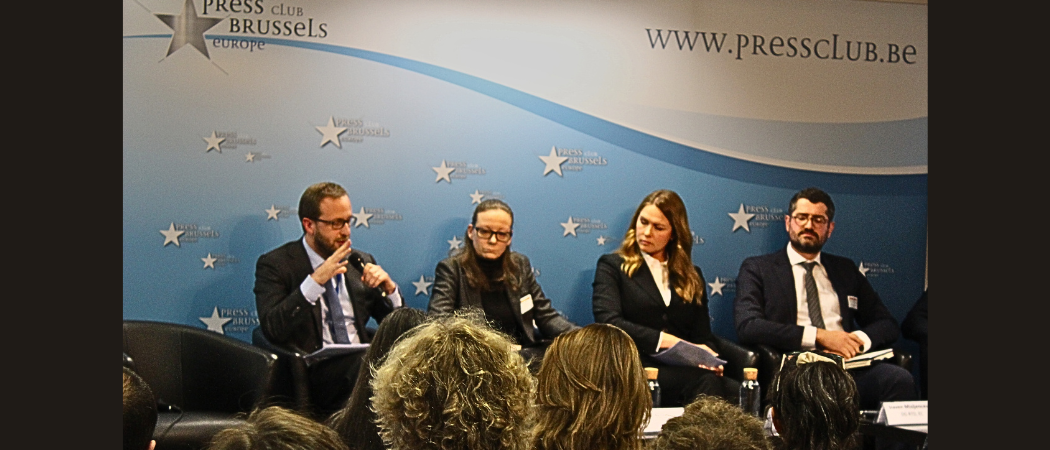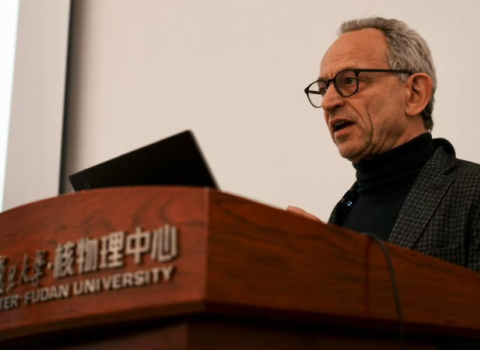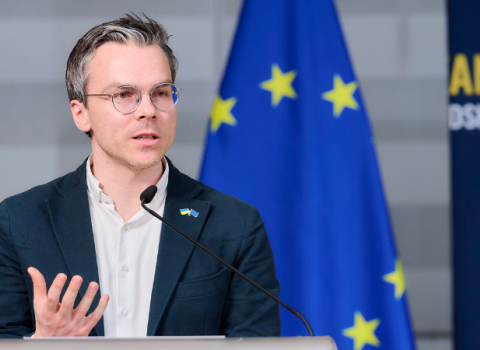Openness and collaboration are the heart of world class science, but as the threat of foreign interference at universities and research organisations ramps up, the Commission wants to agree new restrictions

Panel discussion at a Science|Business conference on security. From left to right: Nicolas Bessot, head of unit for innovation and security research at the European Commission’s home affairs directorate; Mira Yossifova, director of politics and analysis at the Bulgarian Ministry of Innovation and Growth; Egita Aizsilniece-Ibema, head of Brussels office of the Investment and Development Agency of Latvia; Slaven Misljencevic, policy officer at DG Research and Innovation of the European Commission.
The European Commission is preparing the ground for a proposal for Council recommendations on enhancing research security in the face of growing threats from foreign actors.
Slaven Misljencevic, policy officer at the Commission’s research directorate, announced a call for evidence at a Science|Business conference yesterday on the impact of security and defence developments on R&D.
“Since the end of 2019 […] we have observed an increased number of foreign interference cases targeting EU higher education institutions and research performing organisations,” Misljencevic said. “This was relatively new because at that time it was all about open science and being open to the world. Suddenly we were being confronted with an issue that has perhaps been made easier by this openness.”
The call for evidence has opened and runs until 3 January with the aim of adopting the proposal during the first quarter of 2024.
The planned proposal is another sign the EU is reeling back from the mantra of openness, replacing it with the more cautious, ‘as open as possible, as restricted as necessary’ as geopolitical tensions ramp up.
Setting out the rationale for restrictions, the Commission acknowledged openness and international collaboration are at the heart of world-class research. But it said, “With growing geopolitical tensions, our researchers and academics are increasingly confronted with risks when cooperating internationally. It is vital that we support and empower our research performing organisations to address these risks, ensuring research is not misused in a way that affects our security or is unethical.”
The European Commission started discussions with member states and R&D stakeholders in 2020 on their awareness of the threat of foreign interference and whether they were in a position to handle them. The answer on both counts was no, Misljencevic said.
“There is a general consensus that this is not an issue that can be tackled in isolation, it has to be done on several levels […] due to its complexity. That’s why we are working on this at the G7, at EU level, at member state level, at the level of institutions and at the level of individuals,” he said.
In 2021, the Commission proposed a new global approach to international cooperation in research and innovation. It also published guidelines in January 2022 on foreign interference in EU research, setting out guidelines for how higher education institutions and research performing organisations can identify and address risks of foreign interference.
Balancing act
There is a clear understanding in the EU that international scientific collaboration is both necessary for R&D progress and can be widely beneficial.
European Commission President Ursula von der Leyen expressed this in response to questions about collaboration with China, saying the EU does not want “cut economic, societal, political and scientific ties” but needs to figure out urgently how to rebalance its relationship.
“There is clearly a need for Europe to work on de-risking some important and sensitive parts of our relationship,” she told a plenary session of the European Parliament in April this year.
The focus is on how the EU can keep its scientific collaboration open without risking losing sensitive research or technology to malicious actors.
One way to do this is to try to reduce foreign interference in research, Nicolas Bessot, head of unit for innovation and security research at the European Commission’s home affairs directorate, told the Science|Business conference. “If you protect yourself from foreign interference, that’s one way of limiting foreign influence on sensitive technologies or research,” he said.
Alongside the staff working document on foreign interference published last January, the Commission also tightened security procedures for Horizon Europe projects, introducing a mandatory security self-assessment element for applicants under the security appraisal procedure.
“I think what matters is that all these tools are coordinated in an efficient way to make sure there are as few loopholes as possible,” Bessot.
But universities are concerned that the EU’s heightened security approach is going to have unintended consequences on research and academia. Science and technology university alliance CESAER highlighted this in a recent white paper on how best to keep science open, with the paper’s lead author, Irna van der Molen, warning of potential dangers in an opinion piece for Science|Business in October this year.
“There is a genuine concern among scientists and policy makers at universities: such an approach, under the argument of security, will increasingly limit them in their academic and scientific choices, in their choices of whom they admit and recruit, on what to publish or not to publish,” she wrote.
She called for greater dialogue between authorities and universities to manage the fine balance between scientific openness and security.





 A unique international forum for public research organisations and companies to connect their external engagement with strategic interests around their R&D system.
A unique international forum for public research organisations and companies to connect their external engagement with strategic interests around their R&D system.